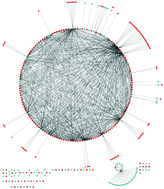A systematic study of chemogenomics of carbohydrates†
Abstract
Chemogenomics focuses on the interactions between biologically active molecules and protein targets for drug discovery. Carbohydrates are the most abundant compounds in natural products. Compared with other drugs, the carbohydrate drugs show weaker side effects. Searching for multi-target carbohydrate drugs can be regarded as a solution to improve therapeutic efficacy and safety. In this work, we collected 60 344 carbohydrates from the Universal Natural Products Database (UNPD) and explored the chemical space of carbohydrates by principal component analysis. We found that there is a large quantity of potential lead compounds among carbohydrates. Then we explored the potential of carbohydrates in drug discovery by using a network-based multi-target computational approach. All carbohydrates were docked to 2389 target proteins. The most potential carbohydrates for drug discovery and their indications were predicted based on a docking score-weighted prediction model. We also explored the interactions between carbohydrates and target proteins to find the pathological networks, potential drug candidates and new indications.


 Please wait while we load your content...
Please wait while we load your content...